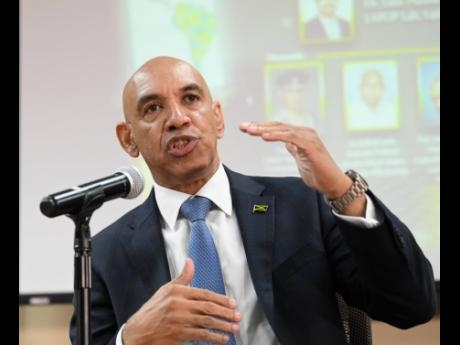POLICE COMMISSIONER Major General Antony Anderson believes that for the Jamaica Constabulary Force (JCF) to function at its highest potential, it will require transformation through young people who have other options, but see the Force as a viable option for upward mobility.
“What is the Force that we want?” asked Anderson, while speaking on the first day of the 80th Jamaica Police Federation Annual Joint Central Conference in Trelawny, on Wednesday. “The answer I have come up with is a Force where the members of the Force who have bright children with options see becoming a police officer as a viable option.
“We have to work on and create a JCF that our members are so invested in, and believe in so much, where that relationship between ourselves and the Force is so tight, that we see it as a viable generational occupation and profession for our children with many options,” he outlined.
According to Anderson, to make a career in the JCF worthwhile for the nation’s bright young people who the organisation is seeking to attract, some issues need to be fixed to create the necessary appeal.
“What is the Force we need that is going to cause young people to be interested, young people with options to be interested in us as opposed to somewhere else?” asked Anderson. “Salary, upward mobility, a chance to do meaningful work, make a difference, experience new things and interface with new technology. To look at their Force in the way they see when they look on TV and what their expectations are of a police force.”
Anderson said when young people want a career which entails modern science and technology, a modernised JCF should fall on their radar.
“When they want a career in forensics or ballistics or just general policing, that the tools they get and the things they have to do business, that makes sense to them, is available to us,” said Anderson. “So, this is part of the notion and idea of transformation.”
Anderson also outlined the need for the organisation to be ready to utilise the skills that young people possess, as well as mentorship on the pre-technology era, which many of them would not know about based on the time they were born.
“In the process of building the Force, we have to take on a lot of young people, and we are doing so. We are doing roughly 1,250 per year, it is three times the number we normally bring in and it is necessary. But it means at the same time that we need adequate supervisors,” said Anderson.
“They (new generation) have no idea of a world without technology. We have to now mentor these young people, these technologically savvy young people with bright ideas and have skills they can attach to problems that we are perhaps not thinking that way, so apart from mentoring, we have to listen to them.”
Continuing, he said that blending experienced police and technology-savvy recruits is the type of mix that will yield very good results, hence his desire to push this initiative.
“Some of the best work you are going to get is when you set some parameters that you get young people to see how best they can find a way for us to communicate with those people who are impacting the problems we have and have to deal with every day,” said Anderson.

